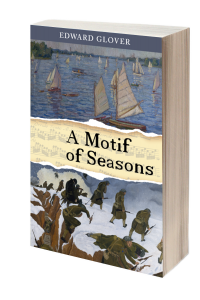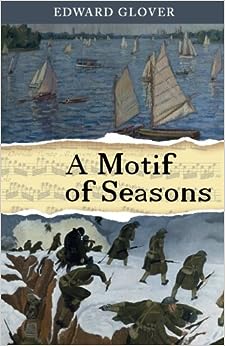The Herzberg Trilogy
A Motif of Seasons
A Motif of Seasons – the last book in the Herzberg trilogy – follows three women as they find love, uncover family secrets locked away in an 18th-century music book, and define their individuality in a patriarchal landscape of social straitjackets and dictated norms.


Overshadowing the social games and vindictive gossip of the European elite, a dark and threatening cloud steadily draws across Europe. On 28th June 1914 an Austro-Hungarian archduke is assassinated and the mounting tension finally snaps. War is declared and the lives of two families will be changed forever.
Set in the latter half of the 19th century, A Motif of Seasons tells the stories of two powerful European families – the von Deppes in Germany and the Whitfields in England – still locked in an ancient rivalry, triggered by an ancestral union. The unexpected marriage in 1766 between the beautiful, capricious and musically accomplished young Arabella Whitfield and the older Prussian military officer Count Carl Manfred von Deppe has left a legacy of distrust and prejudice.
Against the backdrop of a widening and destructive gulf between England and Germany, the book follows three women – Victoria Elise von Böhm, Alice Bartlett and Arabella von Eisenwald – who share the feisty Arabella’s musical talent and passion for life as they find love, uncover family secrets locked away in an 18th-century music book, and define their individuality in a patriarchal landscape of social straitjackets and dictated norms. But the past proves a formidable opponent.
With tales of hidden illegitimate children, sensual affairs and young soldiers braving the horrors of First World War battlefields, A Motif of Seasons is an adventurous, gripping and touching epic about family, love and social freedom.
The following extracts provide a glimpse of A Motif of Seasons and and feature the three main protagonists, Victoria, Alice and Arabella.
“There at the keyboard was the Countess Victoria von Eisenach, dressed in a close-fitting gown of blue taffeta shot with salmon pink, softly bathed in the surrounding candlelight. As she sat on a gold upholstered stool, her sculptured face – framed by loosely pinned-back, rich-dark waved hair – and her straight-backed posture displayed a combination of imperious self-confidence and beguiling femininity. He watched her intensely as she played the poco andante movement of the Bach concerto, her fingers barely touching the keys, her gaze fixed in the distance. He had never heard music played so sublimely. He could not believe that this was the woman he had pressed close to him at Meltwater. He was transfixed.
“Toller looked at the unknown man staring at him – suave, well-educated, neatly dressed, young but with the iron of age in his ice-cold merciless eyes. He had dealt with this sort in the past, using his tricks of the trade, but there was something deeply chilling and cunning about this one.
“If I don’t do what you ask?”
“It is simple, my friend. I will kill you – not now, but when you’re least expecting it. You will be constantly looking over your shoulder but even then you won’t see me coming. That’s my style. Unexpected.”
Toller turned ashen.
“I agree to your terms.”
“Good, Herr Toller, a man to do business with.
“Along the corridor Alice looked into the mirror as she watched her hair, released from its pins, cascade in gentle waves onto her delicate shoulders. She saw Nicolas observing her from the bed in expectation. Her life as a small child in Whitechapel had hung by a thread. Now she was woven through divine fate into a rich family tapestry in a world of legendary rivalries amongst the acclaimed of the social, political and musical spheres, where the struggle for fame and prestige was passionate. Her visit to the east end of London two days before had been an unforgettable reminder that she should constantly strive to retain her husband’s love and loyalty, never to take them for granted; and also a reminder that a close companion in her life would forever be the fear of her existence once again hanging by a single strand. She had resolved as they returned from the palace hand in hand that from now on she would play the part of Scheherazade, with her husband as the king, to be sure he never relinquished her.
She stood to face him, letting slip the crimson shawl she held against her breasts and revealing her slender alabaster body just as a butterfly silently sheds its silken chrysalis to reveal the beauty of its unfolding wings. With a bewitching smile Nicolas had not seen before she beckoned him. Entwined in each other’s arms, they stood pressed together, skin against skin, barely breathing. Then they lay together, warmed and illuminated by the flickering fire. Alice had become the magical princess enticing her king with the promise of more. Their love, she vowed, would be enduring.
“The lake had long been a source of great family pleasure, whether they were afloat on its waters or gazing from the villa windows through the trees at its beauty. Its tranquillity and gentleness, even in the depth of winter, and the sight of its yachts scudding along in the wind had always brought great joy, inspiration and ease of mind, captured in a sunlit painting that hung above the fireplace in the library. On that July evening, at the water’s edge, everyone sensed the ebbing of an epoch, like the ticking of a clock with its hands edging inevitably ever closer towards the witching hour.
The elderly elegant sailing boat slipped silently from the jetty and slid into the twilight, past the indistinct shapes of moored yachts, empty on the black rippling surface. Across the lake on the other shore there were few lights to mar the beauty of the night sky, laced with many stars and decked by a rising moon. No one spoke, each preoccupied with personal thoughts of times past, each apprehensive about what the future might hold. All that could be heard in the absence of voices was the sound of water lapping softly against the hull and the occasional puff of breeze in the linen sails. Arabella broke the silence.
“Uncle Frederick, do you know the story of Rusalka? It is very sad. I cried when I first heard how it ends. Whatever may befall me, if I ever meet a handsome prince, I will never relinquish my voice.”
“I agree, my child,” he replied. “Have no truck with witches or evil ones. You have a beautiful voice. Guard it, nurture it and, whatever tomorrow may bring, use it to assuage sadness and to lift the human spirit. Only the heavens know what we may face.”
No one else spoke. The moon and the stars suddenly vanished; the breeze quickened. The darkness around them was complete, save only for the dim light of the solitary lantern behind the boatman, guiding the boat on into the night, his silhouette barely visible in the yellow rocking glow.
“The Corporal’s Bloody Day
Inky black into battle grey,
Battle grey into bitter blue;
So becomes the hue
Of another bloody day.
Time to move each frozen limb,
Locked night-long in crusted mud;
The guns of the Hun begin to thud
Atop the trench’s brim.
“Sir, men ready for inspection,”
Barks the sergeant,
Midst his men shuffling to attention.
Knee-deep in slime,
Affection I convey
To weary faces, lifeless eyes.
“Will we make it home to Blighty?”
Asks the corporal,
Seeking reassurance.
“Yes,” I shout above the din.
“You’ll make it, Stripey.”
Inspection done, I move along
To the tune of loading rifles, whistled Tipperary song.
All standing ready for the sergeant’s fateful order:
“Lads, forward to the German border.”
Sudden comes the eerie whistle,
Then the deafening cascade,
And vivid pink, floating in the wind like down of thistle.
Alas! No Blighty for poor Stripey, despite the promise made.
And so the day goes on
As other days have gone,
On into another accursed night
Of vanquished hopes and unrelenting fright.
“After they had paused for a crust of bread at midday the first flakes of snow drifted down. The guards urged the men in their charge to work harder. An hour or so later the snow began to fall heavily and the guards ordered the gang to reassemble for the return to Steinhaus. Florian made sure he was present for the roll-call on the edge of the forest and then, as the gang made its way back to the truck, he stopped to relieve himself before momentarily rejoining the line. One of the men fell and a guard struck him with his rifle butt, shouting at him to get up. The gang remonstrated. In the distraction, Florian seized his chance and slipped back into the forest. He crouched, listening, as the shouting continued. Then he heard a shot and the barking of orders. A few minutes later came the sound of the truck receding into the distance. He was now alone – an escaped prisoner. He waited. Once it was dark he walked along the edge of the forest in the direction of Herzberg, scuffing the ground with each step in an effort to disguise his footprints when they came to search for him in the morning.
News about this book

Edward Glover: The History Man
On 18th July 2024, Edward Glover was featured as ‘The History Man’ on the North Norfolk Living.
Character profiles: Discretion and secretive vs. open and rebellious
The final character profile from A Motif of Seasons compares two people, one with a strong sense of discretion, who hides their feelings and keeps secrets, and another with a strong and emotional openness and the rebelliousness of a new generation forged in war. Count Frederick Paul von Deppe Frederick is Count Joseph von Deppe’s…
Character profiles: Unorthodox backgrounds
The penultimate character profile from A Motif of Seasons contrasts a man of enterprise whose character is undermined by greed and disloyalty with a young man from a similar unorthodox background but who does not succumb to the same petty human weakness. Ernst Kiefer Kiefer is a devious fixer, chancer and thug who allows his…
Character profiles: A mother’s blindness
Today’s character profile from A Motif of Seasons features another mother and daughter: a woman, full of suppressed rage and unfulfilled revenge, who fails to see that her daughter, despite her contrasting happiness and success, is just as vulnerable and insecure. Rebecca Bartlett Rebecca is a young English governess to Count Joseph and Countess Beatrice’s…
Character profiles: Inflexibility vs outmanoeuvring
Continuing the series of posts introducing new readers to some of the key characters in A Motif of Seasons, here is the third pairing. Count Joseph von Deppe and his wife Countess Beatrice offer a perfect juxtaposition of Prussian-style inflexibility against a woman’s determined and clever outmanoeuvring. Count Joseph von Deppe He is head of…
Character profiles: The good and dark side of human nature
Continuing the series of posts introducing new readers to some of the key characters in A Motif of Seasons, here are the second pairing. Charles Hardinge and Robert Whitfield typify the contrast between the good and dark sides of human nature and the damage the latter can cause. Charles Hardinge Victoria Elise’s English husband, he…
Character profiles: Who would you be?
Over the next few days, I’d like to introduce new readers to some of the key characters in A Motif of Seasons. As an author, I’m fascinated by the different aspects of human nature, so I’ve decided to pair the characters up to compare and contrast them. Here are the first two. Exemplified by a…
Selected extracts from A Motif of Seasons
With just over 3 weeks to go until the publication of the latest and last book in the Herzberg trilogy, A Motif of Seasons, my diligent team has selected six extracts to provide readers with a little glimpse into what they can expect. My personal favourite is the poem written by Frederick in the bloody…



